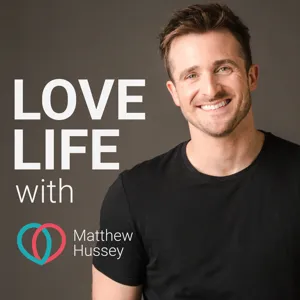Podcast Summary
Making relationships better through deliberate actions: We have the power to improve our relationships through our thoughts and words each day, making them happier and more fulfilling.
Our relationships are not fixed, but rather, they are made and can be improved through deliberate actions. According to Rick Hansen, a clinical psychologist and bestselling author, we have the power to make our relationships better through our thoughts and words each day, despite the influence of others. Hansen emphasizes this idea in his new book, "Making Simple Practices for Solving Conflicts, building connection, and fostering love." He believes that our relationships are like wind chimes played by the wind, and we are the wind that creates the music. Hansen's work as a couples counselor and family therapist has shown him that the practices he outlines in the book can help people get more from their relationships. The title of the book was carefully chosen to emphasize the importance of deliberate action in building and improving relationships. By focusing on our thoughts and words, we can make our relationships a little better each day, ultimately leading to a happier life.
Improving Relationships through Self-Improvement and Effective Communication: Start with self-improvement, practice kindness towards oneself, enhance communication skills, and foster meaningful connections in all relationships.
The book "Simple Practices for a Meaningful Relationship" emphasizes the importance of intentional self-improvement and effective communication in various relationships. The author suggests breaking down relationships into three levels: self, immediate circle, and the broader community. The book is structured into six sections, focusing on befriending oneself, warming the heart, being at peace with others, standing up for oneself, speaking wisely, and loving the world. The author stresses the importance of starting with self-improvement, taking care of one's side of the street, and practicing kindness towards oneself. Through practical and simple practices, individuals can enhance their relationships and navigate external pressures. The book offers a down-to-earth approach to fostering meaningful connections in a world that can feel divisive and challenging.
Befriending Ourselves for Better Relationships: Focusing on self-loyalty, self-acceptance, self-respect, and self-compassion can lead to improved relationships by allowing us to carry less pain and suffering, and be more loving, kind, and caring towards others.
The foundation for improving all of our relationships starts with befriending ourselves. This means being loyal to ourselves, accepting ourselves, respecting our needs, and knowing we are good people. By focusing on these practices, we can develop a greater capacity to be loving, kind, and caring towards others. If we carry around pain and suffering inside of ourselves, it will inevitably impact our relationships. By working on ourselves, we can create positive change that ripples out into our connections with others. The book, "The Power of Now," offers various practices and themes to help us do just that, with a major through line being the importance of mindfulness and effective communication in shaping our relationships for the better.
Building strong foundations for effective conflict navigation: Effective communication, being nice to self and others, and personal regulation are crucial for handling conflicts in relationships.
Effective communication and strong foundations are key to navigating conflicts in relationships, whether personal or professional. The book discussed the importance of being a nice person towards oneself and others as a foundation for handling tough times. Many conflicts arise due to individuals having difficulty expressing their needs and wants. Interactions and relationships are built through turn-taking and effective communication. When conflicts do arise, individuals may get stuck and wonder what to do next. The book aims to provide many useful answers to this question. A consistent theme is the importance of getting better regulated personally as a means to handle conflicts more effectively. Overall, the book emphasizes the importance of doing foundational work before conflicts arise to build strong relationships and effectively navigate conflicts when they do.
Improve communication and understanding in relationships: Focus on delivering the goods, maintaining goodwill, and taking care of your own side of the street for stronger positions and deeper connections.
Effective communication and understanding in relationships can be improved by focusing on delivering the goods to your partner, maintaining goodwill towards them, and taking care of your own side of the street. This approach allows you to establish a strong position to ask for what you need, while also understanding and empathizing with the other person's emotions. It's essential to avoid getting overly invested in the minutiae of their thoughts and intentions, and instead, rest in a simple compassion and kindness towards them. By doing so, you can maintain your independence and effectiveness in the relationship, while also fostering a deeper connection and understanding. A valuable resource for making informed health choices is the ZOE Science and Nutrition podcast, which provides science-based information to help you make smarter decisions for your long-term health.
Exploring resources for physical and emotional health: Listen to the Zoe Science and Nutrition podcast for food insights, tune into the Doctor John DeLaney show for life advice, try OneSkin for skin health, and practice intimacy and autonomy in relationships for emotional well-being
There are valuable resources available to help improve both physical and emotional health. The Zoe Science and Nutrition podcast, hosted by Stephanie, offers insights into food and its impact on the body. Meanwhile, the Doctor John DeLaney show provides practical advice on navigating various life challenges. Additionally, the sponsor, OneSkin, offers a simple solution for maintaining healthy skin. Furthermore, practicing intimacy and autonomy in relationships can lead to a healthier dynamic. This can be achieved through speaking from the heart, not raining on others' parades, admitting fault, and saying what you want directly. These practices can help individuals find the right balance in their relationships and overall well-being.
Stay focused on desired outcome and communicate it clearly: Effective assertiveness requires clarity and confidence in what you want, clear communication, and maintaining topic control to prevent misunderstandings and achieve desired outcomes.
Effective assertiveness requires clarity and confidence in what you want and the experience you're seeking, as well as a sense of worthiness and deservingness of that outcome. It's important to identify the specific experience you're trying to achieve, separate from the form it takes, and to communicate this clearly using specific, unmistakable words. When engaging in a conversation where you're seeking something from another person (represented as "A" and "B" in this context), it's crucial to keep the focus on what you want (represented as "x") and to ensure that the other person has agreed to it before moving forward. This process, known as topic control, helps to prevent misunderstandings and ensures that both parties are on the same page. By staying focused on your desired outcome and communicating it clearly, you'll be more effective in asserting yourself and achieving the results you want.
Clear communication and agreement are essential for healthy relationships: Being clear and specific in communication, understanding each other's expectations, and committing to agreements are crucial for maintaining healthy relationships
Clear communication and agreement are essential building blocks for healthy relationships. Trust, which is based on reliability, forms the foundation of these relationships. However, misunderstandings and unclear expectations can lead to disagreements and issues. When it comes to expressing wants or needs, it's crucial to be specific and clear about what you mean. If an agreement is reached, both parties must commit to upholding it. If not, the agreement may not be effective, and the relationship may need to be adjusted. Effective communication, taking the time to understand each other, and being clear about expectations are key to resolving disagreements and maintaining healthy relationships. In the context of romantic relationships, managing agreements and getting on the same page are crucial once the basic foundations of liking and loving each other have been established. In the personal growth world, as well as in other areas of life, it's important to be specific and clear in our communication to avoid misunderstandings and maintain strong relationships.
Approaching disagreements with curiosity and gentle persistence: Effectively communicate in relationships by addressing broken agreements, calling out lack of commitment respectfully, focusing on personal needs, and creating balance for mutual support and growth.
Effective communication in relationships involves approaching disagreements with curiosity and gentle persistence, while also being willing to tolerate discomfort. Rick Hanson, author of "Making Simple Practices for Solving Conflicts, Building Connection, and Fostering Love," emphasizes the importance of addressing broken agreements and calling out lack of commitment in a respectful way. This process can be uncomfortable for both parties, but it's essential for building strong and healthy relationships. Hanson also encourages focusing on our own needs and wants, and expressing them effectively in our relationships. The ultimate goal is to create a balance between what each person needs, and to rely on each other for support and growth. Hanson's book, based on decades of experience as a couples counselor and family therapist, provides practical tools for fostering love and connection in our relationships.
Building Meaningful Relationships Takes Effort: Deliberate work, clear communication, and self-care contribute to deep and meaningful relationships.
While some relationships may seem effortless, most require deliberate work. It's easy to idealize easy relationships and believe that if a relationship isn't that way, it's not worth pursuing. However, deep and meaningful relationships are often built through intentional effort. These efforts can be as simple as communicating clearly or respecting the other person's wants and needs. Additionally, our relationships with others are influenced by our relationship with ourselves. Addressing personal issues and taking care of ourselves can improve our relationships with others. Rick's book emphasizes the importance of individual effort and the various layers of relationships we can have, from our relationship with ourselves to our relationships with the broader human community. Ultimately, it's up to us to make our relationships work and to put in the effort to build and maintain healthy connections.
Maintaining Healthy Relationships: A Key to Conflict Resolution: Investing in communication, processes, and connections enhances conflict resolution. Rick's book 'Making Great Relationships' provides insights and practical advice.
Investing time and effort into maintaining healthy relationships, even during peaceful times, can significantly improve how we handle conflicts when they arise. The importance of thoughtful communication, adherence to processes, and being proactive in building connections cannot be overstated. Rick's new book, "Making Great Relationships," offers valuable insights and practical advice on these topics. Supporting the Being Well Podcast through Patreon is another way to contribute to this ongoing conversation and gain access to exclusive bonuses. Don't forget to subscribe and share the podcast with others to expand its reach.






